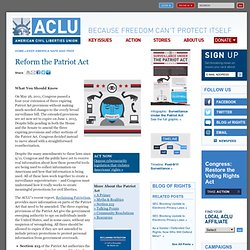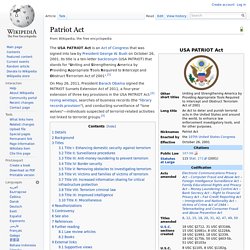

US Constitution vs. The Patriot Act. Reform the Patriot Act - Surveillance, Privacy, and National Security Law Since 9/11. What You Should Know On May 26, 2011, Congress passed a four-year extension of three expiring Patriot Act provisions without making much-needed changes to the overly broad surveillance bill.

The extended provisions are set now set to expire on June 1, 2015. Despite bills pending in both the House and the Senate to amend the three expiring provisions and other sections of the Patriot Act, Congress decided instead to move ahead with a straightforward reauthorization. USA PATRIOT Act. The USA PATRIOT Act is an Act of Congress that was signed into law by President George W.

Bush on October 26, 2001. Its title is a ten-letter backronym (USA PATRIOT) that stands for "Uniting and Strengthening America by Providing Appropriate Tools Required to Intercept and Obstruct Terrorism Act of 2001".[1] On May 26, 2011, President Barack Obama signed the PATRIOT Sunsets Extension Act of 2011, a four-year extension of three key provisions in the USA PATRIOT Act:[2] roving wiretaps, searches of business records (the "library records provision"), and conducting surveillance of "lone wolves"—individuals suspected of terrorist-related activities not linked to terrorist groups.[3] Details[edit] From broad concern felt among Americans from both the September 11 attacks and the 2001 anthrax attacks, Congress rushed to pass legislation to strengthen security controls.